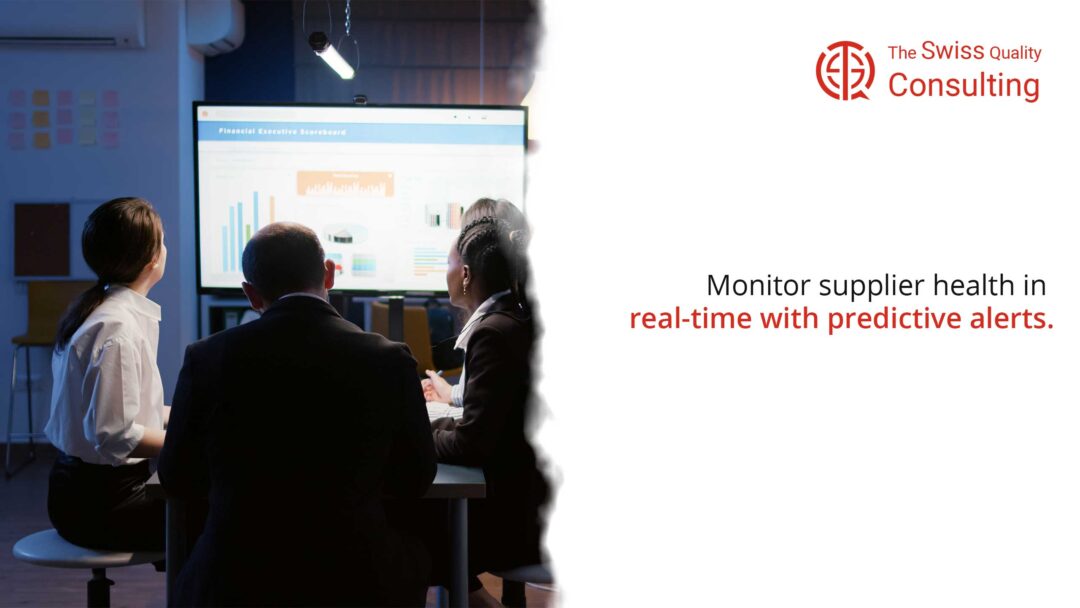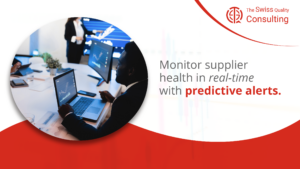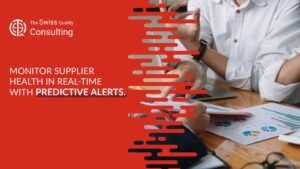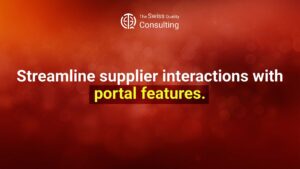Enhancing Supply Chain Resilience through Advanced Monitoring Technologies
Monitoring supplier health in real-time with predictive alerts is increasingly becoming a focal point for business executives, mid-level managers, and entrepreneurs. In a business environment where supply chain resilience is paramount, the ability to predict and respond to supplier issues promptly is crucial for maintaining business continuity and success.
The Critical Role of Real-Time Supplier Monitoring
Real-time supplier health monitoring transcends mere visibility; it serves as a strategic imperative for building a resilient and adaptable supply chain. This transformative approach involves continuously tracking a comprehensive suite of metrics and indicators that offer a deeper understanding of a supplier’s operational performance and financial health. These key insights empower businesses to:
1. Identify and Mitigate Risks Proactively: Real-time data provides early warnings of potential supplier disruptions, allowing businesses to proactively identify and address risks before they impact their operations. This includes anticipating financial instability, production bottlenecks, inventory shortages, and logistical delays, enabling organizations to develop and implement effective contingency plans to minimize disruptions.
2. Improve Supply Chain Visibility and Transparency: Real-time monitoring fosters greater transparency and visibility into supplier operations. This enables businesses to track performance against agreed-upon metrics, monitor delivery timelines, and identify areas for improvement. By fostering greater collaboration and open communication, organizations can build stronger relationships with their suppliers and drive overall supply chain performance.
3. Optimize Inventory Management and Production Planning: Real-time data insights on supplier inventory levels, production capacity, and delivery timelines allow businesses to optimize their inventory management and production planning processes. This enables them to anticipate potential supply shortages, adjust production schedules accordingly, and minimize the risk of stockouts and production delays.
4. Enhance Decision-Making and Agility: Armed with real-time supplier health data, businesses can make informed decisions faster and adapt to changing market conditions more effectively. This enables them to respond proactively to disruptions, find alternative suppliers quickly, and navigate unforeseen challenges with greater agility and resilience.
5. Foster Data-Driven Collaboration and Innovation: Real-time supplier health data serves as a foundation for collaborative innovation within the supply chain ecosystem. By sharing insights and data with their partners, businesses can work together to identify and address challenges, optimize processes, and develop innovative solutions that benefit the entire supply chain.
6. Build a Future-Proof Supply Chain: Real-time supplier health monitoring empowers organizations to build a more resilient and future-proof supply chain. By proactively mitigating risks, optimizing operations, and fostering collaboration, businesses can ensure their supply chains are equipped to withstand disruptions, adapt to changing market dynamics, and thrive in a rapidly evolving global landscape.
Beyond Visibility: A Foundation for Sustainable Growth and Competitiveness:
By prioritizing effective real-time supplier health monitoring, organizations unlock the true potential of a resilient and adaptable supply chain. This strategic approach empowers them to mitigate risks proactively, gain deeper visibility into supplier operations, optimize their supply chains, make informed decisions quickly, and ultimately achieve sustainable growth and competitiveness in a globalized and dynamic business environment.
Embrace the power of real-time supplier health monitoring and embark on a transformative journey towards a future where your supply chain is resilient, adaptable, and ready to thrive in the face of any challenge. By investing in the right technology and fostering a collaborative spirit, you can unlock the full potential of your supply chain and build a future of sustainable success for your organization.
Utilizing Generative AI for Predictive Analysis in Supplier Management
Generative Artificial Intelligence (AI) is transforming the landscape of supplier health monitoring. AI algorithms can process vast amounts of data to identify patterns and predict potential issues before they become critical. This predictive capability enables businesses to take pre-emptive actions, reducing the risk of supply chain disruptions and ensuring smoother operations.
Executive Coaching for Effective Supply Chain Management
Effective supply chain management in the context of real-time monitoring requires specialized leadership and management skills. Executive coaching services can equip leaders with the necessary competencies to manage complex supply chains effectively. These include strategic decision-making, risk assessment, and the ability to lead through uncertainty.
Communication Strategies in Supplier Relationship Management
Effective communication is essential when dealing with supplier issues. Clear and timely communication not only helps in resolving issues more efficiently but also strengthens the relationship between the business and its suppliers. This involves setting up effective channels and protocols for information sharing and collaboration.
Project Management in the Implementation of Monitoring Systems
Implementing a system for real-time supplier health monitoring is a complex project that requires careful planning and execution. Effective project management ensures that the system is implemented efficiently, within budget, and with minimal disruption to ongoing operations. It also ensures that the system is scalable and adaptable to changing business needs.
Change Management for Adopting New Monitoring Technologies
Integrating new technologies into existing processes can be challenging. Effective change management is crucial for ensuring a smooth transition to real-time monitoring systems. This includes training staff, managing resistance to change, and demonstrating the value of predictive alerts in enhancing supply chain resilience.
Conclusion Monitoring Supplier Health in Real-Time with Predictive Alerts
Monitoring supplier health in real-time with predictive alerts is more than just a technological advancement; it’s a strategic approach to supply chain management. In an increasingly volatile business environment, the ability to anticipate and respond to supplier issues swiftly can be a significant competitive advantage.
#SupplyChainResilience, #PredictiveAlerts, #RealTimeMonitoring, #AIinSupplyChain, #RiskManagement, #StrategicManagement












